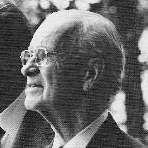L. Nelson Bell
| L. Nelson Bell | |
|---|---|

Medical missionary to China
|
|
| Born |
Lemuel Nelson Bell July 30, 1894 Longdale, Virginia, United States |
| Died | August 2, 1973 (aged 79) Montreat, North Carolina, United States |
| Spouse(s) | Virginia Myers Leftwich Bell |
| Children | 5 |
Lemuel Nelson Bell (July 30, 1894 – August 2, 1973) was a medical missionary in China and the father-in-law of famous evangelist Billy Graham. Few people had more influence on Billy Graham than Bell.
Bell was born in Longdale, Virginia, the son of Ruth Lee (McCue) and James Harvey Bell. Bell and his wife, Virginia Myers (Leftwich) Bell, served as Presbyterian medical missionaries in China from 1916-1941 with the American Southern Presbyterian Mission. They lived on the compound of Love and Mercy Hospital in Qingjiangpu, Jiangsu Province, 300 miles north of Shanghai. They had five children: Rosa,Ruth, Lemuel, Virginia", and Benjamin "Clayton".
Bell kept a busy schedule as surgical chief and administrative superintendent at the hospital. Although the hospital had a pastor on staff, Bell made the healing of souls a priority in his work, gently explaining the Gospel to his patients. He never minimized the importance of addressing the spiritual needs of the people as well as their physical needs.
The Bells returned to the United States before Pearl Harbor in 1941 and retired in Montreat, North Carolina, across the street from their daughter Ruth and Billy Graham.
In 1942, Bell founded The Southern Presbyterian Journal, a publication which championed conservative Presbyterianism within the denomination that had sent Bell and his family to China as missionaries.
From 1942 to 1966, the Southern Presbyterian Journal also championed racial segregation. Historian Kenneth Taylor describes this segregationist stance:
"Paternalistic Journalers professed to love African Americans and to want only the best for them. Integration, the writers insisted, was cruel, and segregation was kind. Thus, social separation was consistent with the Golden Rule, 'to do unto others as you want others to do unto you.' In 1947 Bell wrote without irony that he was 'ashamed at the intolerance, the discrimination, and the humiliations which have been heaped on them [blacks] by the white race' while he defended segregation. … Segregation was kind and Christian."
...
Wikipedia
